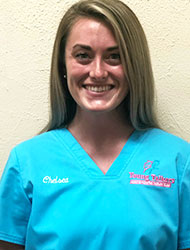
Chelsea Copley
M.S., CCC-SLP
Education:
- College of Wooster Bachelor degree in Communication Sciences & Disorders
- College of Wooster-Early Childhood Teaching License
- Saint Mary’s College-Master’s in Speech-Language Pathology
Licenses & Certificates:
- Clinical Fellowship License to practice in the state of South Carolina
- Received Certificate of Clinical Competence through American Speech-Language-Hearing Association.
Work History:
Specialized Training:
“When Children Won’t Eat: Picky Eaters vs Problem Feeders (Assessment and Treatment Using the SOS Approach)”.
This was a 3-day training conference on the SOS Approach to Feeding. This is a feeding program that is a non-invasive developmental approach to feeding. It is designed to assess and address all the factors involved in feeding difficulties. This approach allows a child to interact with food in a playful, non-stressful way. It focuses on increasing a child’s comfort level through exploring and learning about the different properties of foods, including texture, smell, taste, and consistency. The SOS approach follows a hierarchy to feeding from tolerating foods in the room, interacting with the food, smelling, touching, tasting, and eventually, eating the food.
Welcome to Young Talkers!
Our mission is to provide quality speech-language and feeding therapy services to the pediatric and adult population in order to enhance their verbal/non-verbal communication and feeding skills. We accomplish this by identifying concerns through specialized evaluations and the development of goals to meet the needs of the patient and the family.




